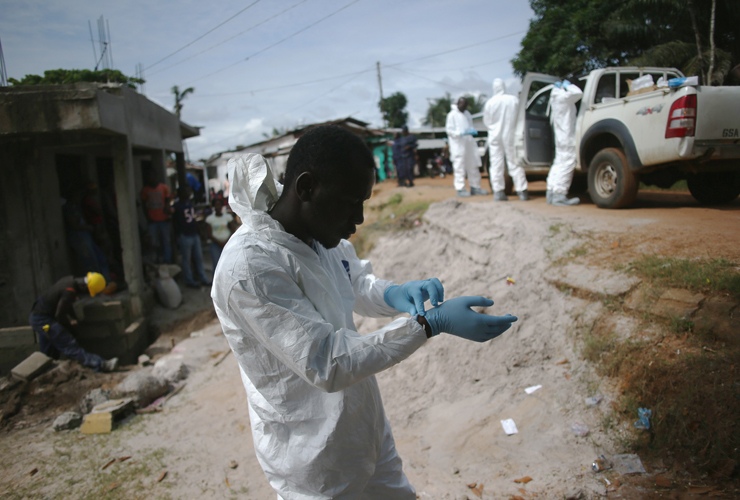Ebola: nationwide lockdown begins in Sierra Leone
Over six million people have been ordered to stay in their homes to help stop the spread of the disease

A free daily email with the biggest news stories of the day – and the best features from TheWeek.com
You are now subscribed
Your newsletter sign-up was successful
The government in Sierra Leone has enforced a three-day nationwide lockdown in an effort to contain the deadly Ebola epidemic in the country.
More than six million people will be confined to their homes until Sunday evening and all trading will cease as healthcare workers go door-to-door, checking people for Ebola symptoms.
They will also remind people about the dangers of touching infected corpses and taking patients to traditional healers instead of hospitals.
The Week
Escape your echo chamber. Get the facts behind the news, plus analysis from multiple perspectives.

Sign up for The Week's Free Newsletters
From our morning news briefing to a weekly Good News Newsletter, get the best of The Week delivered directly to your inbox.
From our morning news briefing to a weekly Good News Newsletter, get the best of The Week delivered directly to your inbox.
"We are still seeing too many infections taking place" [in Sierra Leone], a UN official told the BBC. Healthcare workers warn that people are becoming complacent and are not doing enough to protect themselves from the disease.
Sierra Leone, Guinea and Liberia have set a goal of stopping the spread of the disease by April 16. Despite dozens of new cases each week, Sierra Leone’s president Ernest Koroma is determined to meet that deadline.
"I have made my personal commitment to do whatever it takes to get to zero Ebola infections and I call on every Sierra Leonean in every community to pull together," he said, according to AFP.
A similar, but smaller scale lockdown conducted in September last year was hailed as a success as it helped to slow down the spread of the disease.
A free daily email with the biggest news stories of the day – and the best features from TheWeek.com
The latest lockdown will be lifted for several hours on Friday for Muslim prayers, as well as on Sunday for church services.
Ebola has killed almost 10,200 people, mainly in Sierra Leone, Liberia and Guinea. A total of 79 new Ebola cases were confirmed by the World Health Organization in it latest situation report, of those 33 were in Sierra Leone, 45 in Guinea and one in Liberia.
“While the number of cases has slowed since the peak of the outbreak, the virus is far from eradicated,” reports the BBC.
-
 Quiz of The Week: 14 – 20 February
Quiz of The Week: 14 – 20 FebruaryQuiz Have you been paying attention to The Week’s news?
-
 The Week Unwrapped: Do the Freemasons have too much sway in the police force?
The Week Unwrapped: Do the Freemasons have too much sway in the police force?Podcast Plus, what does the growing popularity of prediction markets mean for the future? And why are UK film and TV workers struggling?
-
 Properties of the week: pretty thatched cottages
Properties of the week: pretty thatched cottagesThe Week Recommends Featuring homes in West Sussex, Dorset and Suffolk
-
 Epstein files topple law CEO, roil UK government
Epstein files topple law CEO, roil UK governmentSpeed Read Peter Mandelson, Britain’s former ambassador to the US, is caught up in the scandal
-
 Iran and US prepare to meet after skirmishes
Iran and US prepare to meet after skirmishesSpeed Read The incident comes amid heightened tensions in the Middle East
-
 Israel retrieves final hostage’s body from Gaza
Israel retrieves final hostage’s body from GazaSpeed Read The 24-year-old police officer was killed during the initial Hamas attack
-
 China’s Xi targets top general in growing purge
China’s Xi targets top general in growing purgeSpeed Read Zhang Youxia is being investigated over ‘grave violations’ of the law
-
 Panama and Canada are negotiating over a crucial copper mine
Panama and Canada are negotiating over a crucial copper mineIn the Spotlight Panama is set to make a final decision on the mine this summer
-
 Why Greenland’s natural resources are nearly impossible to mine
Why Greenland’s natural resources are nearly impossible to mineThe Explainer The country’s natural landscape makes the task extremely difficult
-
 Iran cuts internet as protests escalate
Iran cuts internet as protests escalateSpeed Reada Government buildings across the country have been set on fire
-
 US nabs ‘shadow’ tanker claimed by Russia
US nabs ‘shadow’ tanker claimed by RussiaSpeed Read The ship was one of two vessels seized by the US military